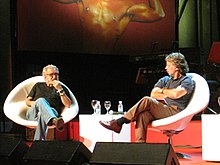Ruy Guerra

Ruy Alexandre Guerra Coelho Pereira , Ruy Guerra for short or Rui Guerra (born August 22, 1931 in Lourenço Marques , Portuguese East Africa ) is a Mozambican-Brazilian actor, film director , screenwriter and poet.
Life
Youth and education
Ruy Guerra, born on August 22, 1931 in Lourenço Marques (now Maputo), the capital of the then Portuguese colony of Mozambique as the son of Portuguese immigrants, grew up in the colony. As a teenager he is said to have written film reviews and made short films, and to have been involved in anti-colonial groups.
At the age of 19, he left Mozambique to study film at the Institut des hautes études cinématographiques in Paris from 1952 to 1954 . Around 1956 Guerra began working as an assistant director for French films before migrating to Brazil in 1958.
Guerra as co-founder of Cinema Novo
During his time in Brazil he created numerous works and is therefore one of the founders of Cinema Novo . In his debut film Os Cafajestes about two Copacabana crooks, he showed the first ever nude scene in Brazilian cinema. The film in the style of the French Nouvelle Vague was shown in the competition at the Berlinale 1962 and established its fame in Latin American cinema together with his second film Os Fuzis , for which he received a Silver Bear at the Berlinale 1964 . Its main intention was to awaken the political consciousness of the urban working population and the rural population.
He received his second Silver Bear at the 1978 Berlinale for A Queda (The Fall), which was intended to be a sequel to Os Fuzis . During his time in Brazil, Guerra also starred in several films as an actor, including Benito Cereno (1969), an adaptation of Herman Melville directed by Serge Roullet , and in Aguirre, the Wrath of God (1972) by Werner Herzog. In the latter he played Don Pedro de Ursua on the side of Klaus Kinski .
Return to Brazil
Due to the difficulties with the censorship of the Brazilian dictatorship, Guerra moved back to Mozambique in 1978, which had gained independence shortly before in 1975.
There he headed the newly created Instituto Nacional do Cinema , which, among other things, produced a kind of monthly " newsreel " under his aegis in 1978/79 under the title Kuxa Kanema , and was broadcast in the rural regions of Mozambique. In 1979 Guerra shot the first Mozambican feature film in black and white entitled Mueda, Memória e Massacre ("Mueda, Memory and Massacre"), which tells the story of the Mueda massacre in 1960. The massacre of the Portuguese army of the population of the city of Mueda in northern Mozambique is considered the starting point for the Mozambique War of Independence.
More creative time
After ten years, Guerra left Mozambique and made films in different parts of the world. One of his most famous films of the 1980s is the 1982 film adaptation of the story The Incredible and Sad Story of the Simple-Minded Eréndira and Her Heartless Grandmother by Gabriel García Márquez under the title Erêndira . The young Erendira was played by his then wife Claudia Ohana , with whom he was married from 1981 to 1984. The grandmother played Irene Papas .
In 1985 he shot the musical comedy A Ópera do Malandro alongside Erêndira , based on the adaptation of Brecht's Threepenny Opera by Chico Buarque . Furthermore, among others, the television film Os Amores Difíceis (1987) and the Spanish television series Fabula de la bella palomera (1988), both based on works by Gabriel García Márquez. His last film as a director to date was made in 2004: O Veneno da Madrugada (The Evil Hour) was also based on a story by Gabriel García Márquez. For more than ten years, Guerra tried to obtain funding for the film; the film is considered a commercial fiasco.
After the end of his main career in film, Guerra led the advanced course for film studies at the Gama Filho University from 2005 to 2008 . Since 2009 Guerra has been teaching at the Darcy Ribeiro School , one of the most important Brazilian film schools.
Filmography
Director
- 1954: Quand le soleil there
- 1962: Os Cafajestes
- 1964: Os Fuzis
- 1970: Os deuses e Os Mortos
- 1973: Ternos Caçadores
- 1978: A Queda
- 1981: A Carta Roubada
- 1981: Histoires extraordinaires: La lettre volée (TV)
- 1982: Mueda, Memória e Massacre
- 1983: The unbelievable and sad story of the innocent Erendira and her heartless grandmother (Erêndira)
- 1986: Ópera do Malandro
- 1988: The Beauty with the Doves (Fábula de la Bella Palomera)
- 1989: The Demons of the Jungle (Kuarup)
- 1992: Me alquilo para soñar (TV series)
- 2000: Monsanto (TV)
- 2000: Estorvo
- 2004: Portugal SA
- 2006: O Veneno da Madrugada
actor
- 1957: SOS Noronha
- 1962: Os Mendigos
- 1969: Benito Cereno
- 1970: Le maître du temps
- 1972: Les soleils de l'Ile de Pâques
- 1972: Aguirre, the wrath of God
- 1978: The Fall (A Queda)
- 2005: Casa de Areia
- 2010: 5x Favela, Agora por Nós Mesmos
Web links
- Ruy Guerra in the Internet Movie Database (English)
- Biography of Ruy Guerra
Individual evidence
- ↑ a b c d e f g Isabel Morais: Guerra, Rui . In: Emmanuel K. Akyeampong and Henry Louis Gates, Jr (Eds.): Dictionary of African Biography . tape 2 . Oxford Press, Oxford 2012, ISBN 978-0-19-538207-5 , pp. 515 f .
| personal data | |
|---|---|
| SURNAME | Guerra, Ruy |
| ALTERNATIVE NAMES | Pereira, Ruy Alexandre Guerra Coelho; Guerra, Rui |
| BRIEF DESCRIPTION | Mozambican-Brazilian actor, film director , dramaturge and poet |
| DATE OF BIRTH | August 22, 1931 |
| PLACE OF BIRTH | Lourenço Marques , Portuguese East Africa |

